- Home
- Johnny D. Boggs
And There I’ll Be a Soldier Page 5
And There I’ll Be a Soldier Read online
Page 5
In all his years, Caleb had heard some blood-and-thunder sermons in his time, but never had Caleb heard a preacher calling for blood and thunder, for destruction and desolation, for the rivers in the South to overflow with blood. Instead of glory, Garner besought gore. Caleb drew in a deep breath and shook his head, amazed, after Garner said amen.
The speechifying continued after Garner saluted Colonel Morgan and fell back into line behind the company commanders.
“Battalion,” Colonel Morgan said, and he drew the tiny sword from its scabbard.
Chuckles from the ranks were quickly squashed by sergeants as vehement as Harold Masterson.
Morgan held the sword up toward his face, and Caleb thought that the colonel’s hat was as small as his sword. After clicking his heels, the colonel returned the small weapon into its sheath.
“I’ve seen pocket knives bigger than that thing,” someone whispered, prompting Sergeant Masterson’s growl.
Standing in the center of the field, W. James Morgan seemed not to notice the commotion his diminutive sword had caused.
“Your colonel congratulates himself on being at the head of a regiment that would have done honor to Julius Cæsar. I must also congratulate you on the fine progress you continue to make. Many regiments I have had the honor to command, in Indiana and Ohio, but never have I found your equal.”
He gave a slight bow and, turning to his adjutant, gave a quick nod.
“Eyes front!” the adjutant shouted.
Easy enough.
“Shoulder arms!”
One of the German twins brought his musket up. Caleb cringed. His rifle remained in the tent. Seb Woolard slapped his shoulder with the palm of his right hand. When the other Ehrenreich did the same, Caleb followed suit, and soon he could hear the slapping of hands on shoulders.
“By thunder!” Morgan’s voice carried over the laughter seeping out of the line of soldiers. “The issue of guns did not cross my mind.” He looked again at the adjutant.
“Parade, rest!” Godfrey shouted.
Seb Woolard squatted, but the anger in Sergeant Masterson’s eyes warned Caleb that his new friend had made another mistake. The barber’s hands roughly jerked Woolard to his feet, then shoved him roughly to the ground.
“Sergeant.”
It was Captain Clark who spoke in a surprisingly calm voice.
Woolard quickly climbed to his feet, and tried to approximate the stance of other soldiers.
Clark strode to the line. “A gentle hand is sometimes in order, Sergeant.”
Masterson’s lips tightened. His fists clenched.
“You didn’t cut everyone’s hair the same way, did you?” Clark asked.
“No, sir.”
Clark tilted his head. “You disagree with me, Sergeant?”
Masterson stood mute.
“You may speak freely, Sergeant.”
The sergeant remained rigid.
“You fought in Mexico, didn’t you, Sergeant?”
“Yes, sir.”
“So did I.”
“I know that, Captain.”
“I saw the elephant more than anyone should, Sergeant.”
No response.
“This war will be over shortly, Sergeant. And our regiment will only protect Missouri. A rough hand …”
“Does the captain still give the sergeant the right to say his piece?” Masterson interrupted.
Surprised, Clark slowly nodded.
“What you saw, what I saw in Mexico, Captain, will bear little resemblance to what we are going to observe, sir. Even if we never leave Missouri, sir, because of Sam Jones and Lawrence, and John Brown and Pottawatomie. Because of Black Jack and John Reid’s raid on Osawatomie …”
Names. Caleb knew of John Brown. Bessy used to sing “John Brown’s Body,” and he could vaguely recall hearing something about Osawatomie, but Sam Jones, Lawrence, Black Jack, Pottawatomie … those meant nothing to him, about as much as Laclede and Milan and, gee willikins, even Keytesville, had just a few weeks earlier.
“The Rebels will fight, sir,” Masterson continue, “and put up quite a row before peace ever returns to Missouri, or our United States.” He looked to be about to continue, but instead merely concluded: “Sir.”
Clark nodded respectfully and stepped aside, now addressing his men. “How many of you men have arms? Muskets. Shotguns. Rifles.”
The Ehrenreichs and Caleb raised their arms, but a surprising number of men, Seb Woolard included, merely dropped their heads in shame.
“Heads up, men,” Clark said. “I see your musket, er …?”
The German said: “Ewald Ehrenreich.”
“I don’t recognize it.”
“It was made by our grandfather,” the German boy said. “He made one for Rémy, my brother, too.”
Clark turned to Rémy, and Caleb tried to find something that would separate the twins, help him identify them, but other than the fact that, for the moment, Ewald held a musket and Rémy looked jealous, he could find no difference.
“Your musket?” Clark asked Rémy.
“Back yonder,” he muttered. “He wouldn’t let me fetch it.” He nodded at Sergeant Masterson. “Made me come back here to stand at attention.”
“Caliber?” Clark had turned back to Ewald. Yet as Ewald answered, “Forty caliber, sir,” the captain was staring at the German’s bare feet, then at those of his twin’s. He wanted to ask. Caleb could tell, but Captain Clark bit his bottom lip. Caleb could have told him that the twins came with weapons, but no shoes. They didn’t even have a change of clothes, only the rags they wore morning, noon, and night.
“And you?” Clark stepped in front of Caleb.
“A long rifle, sir,” Caleb answered “It’s in the tent. I can fetch …”
“Tent?”
“Yes, sir.” He felt a little ashamed. Seb Woolard had joined the Missouri Rangers with a tent, not much of one, and rumored to have been stolen, but it kept the dew off, although it was rather small for Seb, Caleb, and the twins. Had been even smaller, before Harold Masterson became a sergeant. “Umm …” He couldn’t think of anything else to add.
“That’s all right, Caleb.”
Caleb grinned. Captain Clark remembered his name.
“By long rifle, do you mean a flintlock?”
“Yes, sir. Pa calls it a Kentucky rifle. He’s had it …” He shrugged, and smiled.
His grin faded as Clark sighed heavily, shaking his head. “A flintlock. What caliber, Caleb?”
Caleb opened his mouth, then closed it. His face flushed, and he had to fight to keep his head up. “I … I … I don’t know, sir.”
“That’s all right.” The captain stepped down the line.
“I got a pitchfork, Capt’n,” drawled a freckle-faced kid with auburn hair.
“I see that, soldier.”
* * * * *
They issued passes that morning to send those soldiers without firearms—Colonel Morgan instructed the men that axes, pitchforks, and hickory sticks did not count as firearms—to go home or into Laclede or Brookville or Meadville and come back with something that would shoot.
Caleb had half a mind to find a new weapon himself, but Ewald Ehrenreich told him, after examining the rifle, that it was a magnificent piece—.52 caliber, the twin guessed after examining the lead balls—and Caleb figured that, if his weapon could impress a German whose grandfather had made two muskets, well, then, maybe he’d just keep the rifle that had been in Caleb’s own family as long as he could remember.
The passes were for only two or three days, and Caleb wondered how many soldiers would bother to return to Laclede. This soldiering wasn’t anything like Caleb thought it would be. Drilling and marching, drumbeats and sore feet. He had hoped the rangers would have driven the Keytesville Methodist Rangers out of the state b
y now, after a bloody but glorious battle. After the rough treatment Sergeant Masterson had given Seb Woolard, Caleb was surprised when Seb returned that evening.
“What you think?” Seb thrust out the oddest-looking thing Caleb had ever seen.
“What is it?”
“It’s a gun, idiot. Look.” He removed the stock, dropped it onto his bedroll, and brandished it like a pistol. A pistol with a fifteen-inch barrel flaked with rust and a tad crooked.
“Where did you get it?”
“There was a peddler set up on the main street right in Laclede,” Seb bragged. “He was selling these like hot cakes. Only cost eleven dollars.”
“You paid eleven dollars”—Rémy Ehrenreich rolled his eyes—“for that?”
Seb was fiddling with the cheap weapon, trying to affix the stock back onto the weapon. It clicked, and, beaming, Seb Woolard proudly shouldered his new musket.
“How’s that?” he asked, and Caleb had to grin.
He wouldn’t want to be standing anywhere near Seb when he fired that thing.
Chapter Six
September 8, 1861
Galveston, Texas
This man’s army proved impossible to figure out.
One minute he was a corporal with the Bayland Guards, then learned that he was part of Company C, First Regiment, Texas Infantry, only later to be told—along with Ashbel Smith and the rest of the guards—that Richmond had already designated a First Texas Infantry, commanded by John Bel Hood, so now Ryan McCalla was fighting in the Second Texas Infantry of the Confederate States of America.
Fighting? Ryan snorted and slapped at a mosquito with the copy of the Galveston Civilian and Weekly Gazette he had just rolled up.
“Can I see that?” Matt Bryson asked.
Without looking up or rising off his cot, Ryan handed the newspaper to his friend.
“What’s happening in the world?” Gibb Gideon asked.
Shrugging, Ryan answered: “Everybody’s still celebrating Manassas, and Ben McCulloch and our Texas boys whipped the Yankees last month at some place called Wilson’s Creek.”
“Where’s that?” Harry Cravey asked.
“Missouri,” Sam Houston Jr. answered. Sam had already read the newspapers.
“By jacks,” Matt said, slapping the newspaper across his thigh, “we’re going to miss the whole war.”
“Yeah,” Harry Cravey said. “I’d like at least to shoot at a Yankee.”
“With what?” Gibb Gideon chided. “All you got is an axe.”
That resulted in some sniggers in the barracks, echoed by Baby Cravey’s objections.
Sluggishly Ryan swung his legs off the cot and sat up, running his fingers through his hair and stifling a yawn. His bunkies were the same—the war was the same—everything was the same.
Oh, the Bayland Guards had merged into the Second Texas Infantry, along with a bunch of other once-independent militias across South Texas: the San Jacinto Guards from Lynchburg; from Harris County, the Confederate Grays; the Texana Guards out of Jackson County; Dr. Belvedere Brooks’ recruits from Wheelock Prairie; the city of Houston’s own Confederate Guards; the Burleson Guards and Lexington Grays from Burleson County, and the Gonzales Invincibles and Wilson Rifles from Gonzales County, now Company I. Ryan and the Bayland boys still took orders from Captain Ashbel Smith, but Smith these days had to take his orders from a Tennessean colonel named John Creed Moore.
Boy howdy, did Colonel John Creed Moore love giving orders.
Six days a week, the companies filed out of warehouses and cotton compresses and into the summer heat or pounding rain where they would drill and drill and drill.
At first, Ryan had enjoyed his promotion to corporal, and his fiddling, but soon he regretted he had ever learned to play any musical instrument. “Reveille” and roll call began at 6:00 a.m. every morning, but the designated buglers had to assemble at 5:45. Among the ten companies of the Second Texas, only three had bugles, but there were also four drums and two fiddles. Company I, consisting of two militias from Gonzales County, had a kid with a jew’s-harp, who probably had not even reached being thirteen years old yet.
“The worst band I ever heard,” Matt Bryson frequently complained.
After roll call, the soldiers wolfed down breakfast, then went through fatigue call and sick call before those so-called buglers had to assemble again.
After that the drilling began, and Ryan had to join his friends, filing into line from right to left with Company C, née the Bayland Guards, always in the middle, between Company H, formerly the Lexington Grays, and Company K, the Texana Guards. That’s another thing Ryan couldn’t fathom about this man’s army. There were ten companies, but there was no Company J. The brass skipped that letter and made it K.
“To avoid confusion,” Captain Smith had explained.
Which left Ryan scratching his head until Sam Jr. had told him: “An I could be mistaken for a J in written orders.” Ryan had accepted that until he read over a letter Gibb Gideon was writing his mother, and Gibb’s Hs looked more like Ks than anything else. When he tossed that argument to Little Sam, his tall friend merely smiled and said: “I don’t think Gibb Gideon will ever be writing any orders, Ryan.”
Double-quick steps … soldier arms … loading and firing weapons (for those that had weapons) by squad or rank … bayonet exercise … more marching … wheeling … right turn … left face … company halt!
He heard those commands in his sleep.
Little Sam still wore the only real uniform in Company C, excepting Captain Smith’s moth-eaten blouse, but Colonel Moore kept promising that they would be getting uniforms that Texas had appropriated from Union soldiers after the Secession. He also said they’d be getting captured Yankee weapons as well.
When they weren’t repeating the three motions required to fix a bayonet—a silly drill, Ryan declared, since a search would turn up fewer than thirty bayonets in the entire company—or a right or left oblique, the Second Texas dug.
Lengthening ditches—or what the officers called trenches—or shoveling mounds of sand to build fortifications—or what the officers called redoubts—along the coastline or on the outer islands. Ryan really had to laugh at Colonel Moore’s orders to dig those trenches on the barrier islands. “Yeah, he’s from Tennessee, all right,” he’d say as soon as salt water began seeping into those trenches after only minutes of shoveling. A few of the boys from Burleson County had taken to calling Moore “the king of spades,” the same moniker Ryan had read that some Confederates had slapped on this general named Lee up in Virginia.
Still sitting on his cot, listening to the rain pelting the warehouse’s roof, Ryan stared at his hands, once smooth but now callused from using the shovels near the beaches, and the long wooden pole they forced him to use during drills until the Second Texas Infantry issued him a real musket.
“This just isn’t fair,” Matt Bryson said again, and stood, slapping Ryan’s knee and saying: “Let’s go.”
Ryan looked up. “Go where?”
“I don’t know. Somewhere.”
He pushed himself off the cot, grabbed an India rubber poncho off the wall, and pulled it over his head, then found his hat, and waited, looking at his messmates while Matt Bryson laced his brogans and grabbed a wide-brimmed straw hat, already battered and ruined from recent rains.
Coughs and sneezes echoed throughout the warehouse as they made their way to the big doors. It was late Sunday afternoon, and Colonel Moore did not drill his soldiers on Sundays, although they had held a dress parade that morning. Since the end of September, the squalls had begun pelting the coast with wind and rain, and now it seemed as if half of the regiment had taken sick. Or, rather, half of the regiment had the good sense to report for sick call and get out of the drills and diggings. Sunday afternoons, after worship, the boys had free time. Usually Baby Cravey would head home, but
he had pretty much stopped that since the rains began, and since P. M. Woodall, who had been elected the company’s second lieutenant, had sternly warned him that Colonel Moore was “by the book”—Hardee’s Rifle and Light Infantry Tactics, without question—and could have Cravey flogged, shackled, or even shot if he didn’t stop his tomfoolery. The weather had stopped the others. Habitually Gibb Gideon would have hit the dram shops along the harbor, Little Sam Houston would go courting or visiting some high society businessman, and Ryan and Matt would either go fishing, shrimping, or frog-gigging if not trying to manage a quick visit with their folks.
It was too late to head to up to Cedar Bayou, and the pattering on the roof told Ryan that the rain had not abated. He didn’t know what Matt Bryson had in mind, but he followed his friend out the door, anyway.
Rain pelting their faces, they ran down the shell-paved street and leaped onto the back of a covered wagon, hitching a ride for a few blocks, and leaping off when they reached the Strand. They turned west down the street, staying close to the wooden buildings, slowing down only underneath the awnings. Ryan trailed Matt, who passed a vendor and deftly pocketed two apples, before turning a corner and sprinting toward Galveston Bay.
Despite the rain, the wharf was busy. The two boys wove through a path lined by cotton bales and hogsheads, barrels and boxes, slipping between stevedores and roustabouts—able-bodied men who, Ryan and most of the Second Texas believed, should have been serving in the Confederate Army; “wharf lice,” Captain Ashbel Smith called them. Slaves, scantily dressed demimondes, and drunken sailors also roamed about. A calliope whistled, echoed by a deep horn. Black smoke and embers belched out of the stacks of one of the docked steamboats, mixing with the rain, fog, and gloaming.
Finally Matt Bryson stopped. If he hadn’t, he would have stepped off the wharf and into the bay. He stared out into the deepening blackness.

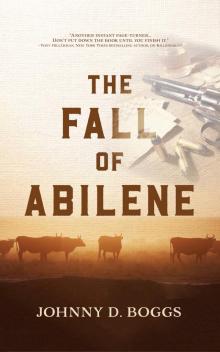 The Fall of Abilene
The Fall of Abilene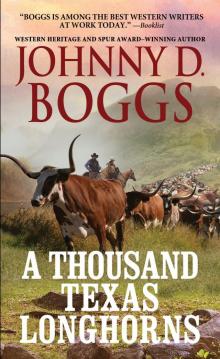 A Thousand Texas Longhorns
A Thousand Texas Longhorns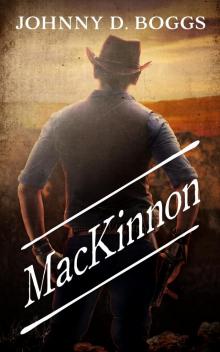 MacKinnon
MacKinnon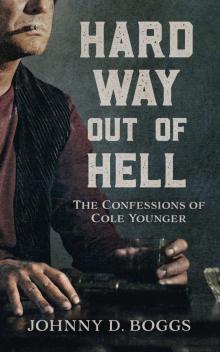 Hard Way Out of Hell
Hard Way Out of Hell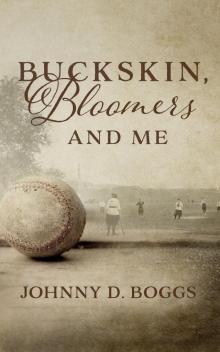 Buckskin, Bloomers, and Me
Buckskin, Bloomers, and Me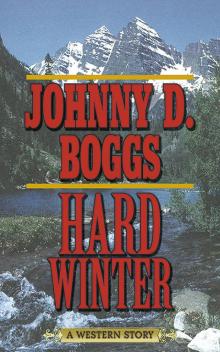 Hard Winter
Hard Winter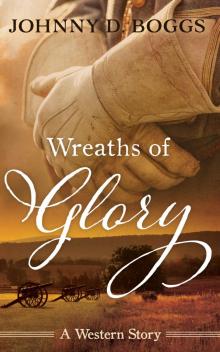 Wreaths of Glory
Wreaths of Glory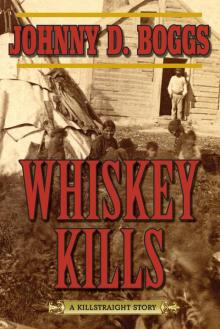 Whiskey Kills
Whiskey Kills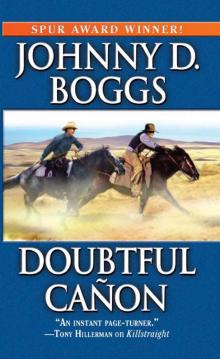 Doubtful Canon
Doubtful Canon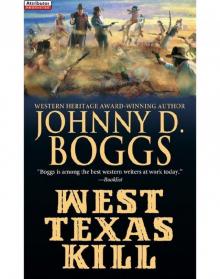 West Texas Kill
West Texas Kill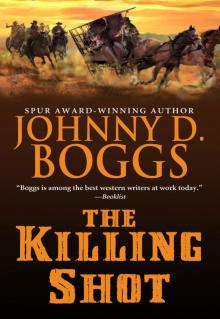 The Killing Shot
The Killing Shot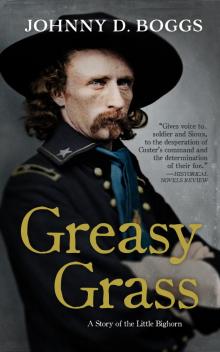 Greasy Grass
Greasy Grass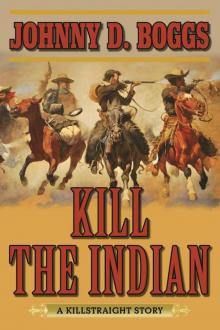 Kill the Indian
Kill the Indian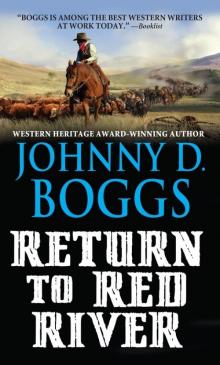 Return to Red River
Return to Red River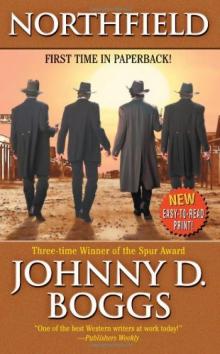 Northfield
Northfield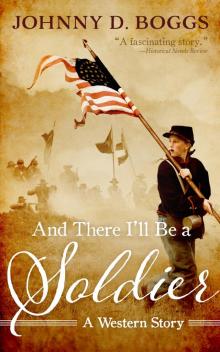 And There I’ll Be a Soldier
And There I’ll Be a Soldier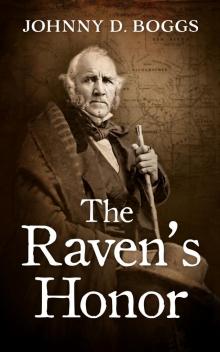 The Raven's Honor
The Raven's Honor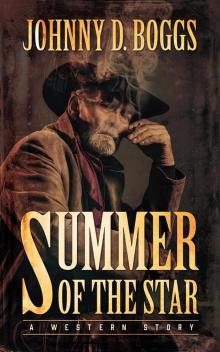 Summer of the Star
Summer of the Star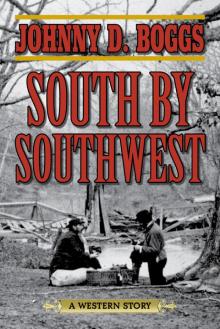 South by Southwest
South by Southwest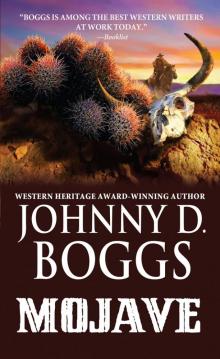 Mojave
Mojave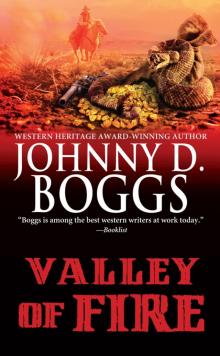 Valley of Fire
Valley of Fire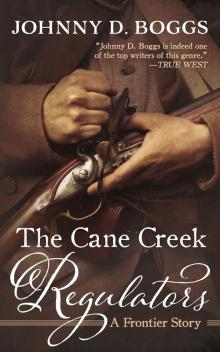 The Cane Creek Regulators
The Cane Creek Regulators